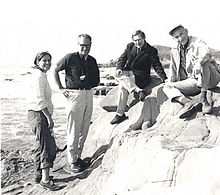American biologist (1924–2008)
Gunther S. Stent (March 28, 1924 – June 12, 2008[1]) was a graduate professor of molecular biology at the University of California, Berkeley. An early bacteriophage biologist, he was known also for his studies on the metabolism of bacteria and neurobiology of leeches, and for his writing on the history and philosophy of biology.
Life and career
He was born Günter Siegmund Stensch in Berlin, Germany. His surname was changed following his emigration to the US in 1940, where he went to live in Chicago. He received his BS (1945) and PhD (1948) from the University of Illinois.[2]
In 1949, Stent joined the so-called phage group that coalesced around Max Delbrück at the California Institute of Technology in Pasadena. This was the incubator for many of the fundamental ideas of the newly emerging science of molecular biology. Informal discussions among these workers on the progress of their research led to a book by Stent, entitled Molecular Biology of Bacterial Viruses (dedicated to Delbrück), which was an account of the state of accomplishments in the field up to 1963.[3] Later, in his memoirs,[4]
His introductory textbook Molecular Genetics: an Introductory Narrative has been translated into Italian, Japanese, Russian, and Spanish.[citation needed]
He was also known for his works on the progress of science, especially his 1969 lectures at Berkeley, published as The Coming of the Golden Age.[5]
Stent was a member of the American Academy of Arts and Sciences, the United States National Academy of Sciences, and the American Philosophical Society.[6][7][8]
He died of pneumonia on June 12, 2008, at the age of 84.[9]
